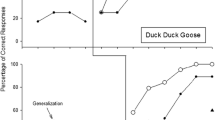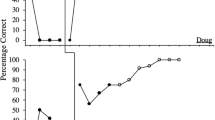Abstract
A naturalistic social skills training program was used to teach assertive responses to three autistic adolescents. Training and assessment of positive and negative assertions occurred in the context of two game situations—a card game and a ball game. Training consisted of modeling and behavioral rehearsal prior to each game, with tokens delivered contingent on assertive responses. Evaluation of training effects was accomplished in a multiple baseline across response classes. The results demonstrated the effectiveness of the procedure in generating high levels of positive and negative assertions that maintained across a 4.5-month follow-up interval. This in vivo procedure for teaching social behaviors permits the concurrent acquisition of assertive responses and leisure behaviors, two skills that are of special importance in improving the quality of autistic youth's experiences with their peers.
Similar content being viewed by others
References
Eisler, R. M., Hersen, M., Miller, P. M., & Blanchard, E. B. (1975). Situational determinants of assertive behaviors,Journal of Consulting and Clinical Psychology, 43, 330–340.
Matson, J. L., & Stephens, R. M. (1978). Increasing appropriate behavior of explosive chronic psychiatric patients with a social-skills training package.Behavior Modification, 2, 61–76.
McCoy, J. F., McGee, G. G., Price, D., & Mason, D. (1980, November).Social skills training for aggressive children while playing competitive games. Paper presented at the meeting of the Association for Advancement of Behavior Therapy, New York.
National Society for Autistic Children (1978). National Society for Autistic Children definition for the syndrome of autism.Journal of Autism and Childhood Schizophrenia, 8, 162–167.
Ragland, E. U., Kerr, M. M., & Strain, P. S. (1978). Behavior of withdrawn autistic children: Effects of peer social initiations.Behavior Modification, 2, 565–578.
Strain, P. S., Shores, R. E., & Kerr, M. M. (1976). An experimental analysis of “spillover” effects on the social interaction of behaviorally handicapped preschool children.Journal of Applied Behavior Analysis, 9, 31–40.
Strain, P. S., Shores, R. E., & Timm, M. A. (1977). Effects of peer social initiations on the behavior of withdrawn preschool children.Journal of Applied Behavior Analysis, 10, 289–298.
Strain, P. S., & Timm, M. A. (1974). An experimental analysis of social interaction between a behaviorally disordered preschool child and her classroom peers.Journal of Applied Behavior Analysis, 7, 583–590.
Turner, S. M., Hersen, M., & Bellack, A. S. (1978). Use of social skills training to teach prosocial behaviors in an organically impaired and retarded patient.Journal of Behavior Therapy and Experimental Psychiatry, 9, 253–258.
Twardosz, S., & Jozwiak, W. (1981). The expression of affection: Suggestions for research with developmentally disabled children.Analysis and Intervention in Developmental Disabilities, 1, 217–238.
Author information
Authors and Affiliations
Additional information
This research was supported by Grant No. MH20030 awarded by the National Institute of Mental Health (Center for Studies of Crime and Delinquency) to the Bureau of Child Research, University of Kansas. The authors thank Joylyn G. Bailey and Michael J. Tyburczy for their contributions to the progress of these youth.
Rights and permissions
About this article
Cite this article
McGee, G.G., Krantz, P.J. & McClannahan, L.E. Conversational skills for autistic adolescents: Teaching assertiveness in naturalistic game settings. J Autism Dev Disord 14, 319–330 (1984). https://doi.org/10.1007/BF02409582
Issue Date:
DOI: https://doi.org/10.1007/BF02409582




